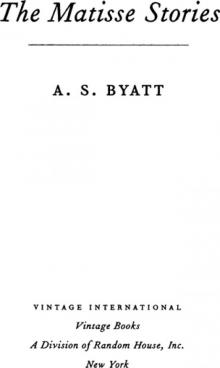- Home
- A. S. Byatt
Possession Page 3
Possession Read online
Page 3
Val left him for the first time since they set up house, and went briefly “home.” Home was Croydon, where she lived with her divorced mother in a council flat, supported by social security, supplemented occasionally by haphazard maintenance payments from her father, who was in the Merchant Navy and had not been seen since Val was five. Val had never, during their time together, proposed to Roland that they visit her mother, though Roland had twice taken her to Glasdale, where she had helped his father wash up, and had taken his mother’s jeering deflation of their way of life in her stride, telling him, “Don’t worry, Mole. I’ve seen it all before. Only mine drinks. If you lit a match in our kitchen, it’d go up with a roar.”
When Val was gone, Roland realised, with a shock like a religious conversion, that he did not want their way of life to go on. He rolled over, and spread his loosened limbs in the bed, he opened windows, he went to the Tate Gallery alone and looked at the dissolving blue and gold air of Turner’s Norham Castle. He cooked a pheasant for his rival in the departmental rat-race, Fergus Wolff, which was exciting and civilised, although the pheasant was tough and full of shot. He made plans, which were not plans, but visions of solitary activity and free watchfulness, things he had never had. After a week, Val came back, tearful and shaky, and declared that she meant at least to earn her living, and would take a course in shorthand-typing. “At least you want me,” she told Roland, her face damp and glistening. “I don’t know why you should want me, I’m no good, but you do.” “Of course I do,” Roland had said. “Of course.”
When his DES grant ran out, Val became the breadwinner, whilst he finished his PhD. She acquired an IBM golfball typewriter and did academic typing at home in the evenings and various well-paid temping jobs during the day. She worked in the City and in teaching hospitals, in shipping firms and art galleries. She resisted pressure to specialise. She would not be drawn out to talk about her work, to which she almost never referred without the adjective “menial.” “I must do just a few more menial things before I go to bed” or, more oddly, “I was nearly run over on my menial way this morning.” Her voice acquired a jeering note, not unfamiliar to Roland, who wondered for the first time what his mother had been like before her disappointment, which in her case was his father and to some extent himself. The typewriter clashed and harried him at night, never rhythmical enough to be ignored.
There were now two Vals. One sat silently at home in old jeans and unevenly hanging long crêpey shirts, splashed with murky black and purple flowers. This one had lustreless brown hair, very straight, hanging about a pale, underground face. Just sometimes, this one had crimson nails, left over from the other, who wore a tight black skirt and a black jacket with padded shoulders over a pink silk shirt and was carefully made up with pink and brown eyeshadow, brushed blusher along the cheekbone and plummy lips. This mournfully bright menial Val wore high heels and a black beret. She had beautiful ankles, invisible under the domestic jeans. Her hair was rolled into a passable pageboy and sometimes tied with a black ribbon. She stopped short of perfume. She was not constructed to be attractive. Roland half wished that she was, that a merchant banker would take her out to dinner, or a shady solicitor to the Playboy Club. He hated himself for these demeaning fantasies, and was reasonably afraid that she might suspect he nourished them.
If he could get a job, it might be easier to initiate some change. He made applications and was regularly turned down. When one came up in his own department there were six hundred applications. Roland was interviewed, out of courtesy he decided, but the job went to Fergus Wolff, whose track record was less consistent, who could be brilliant or bathetic, but never dull and right, who was loved by his teachers, whom he exasperated and entranced, where Roland excited no emotion more passionate than solid approbation. Fergus was also in the right field, which was literary theory. Val was more indignant than Roland about this event, and her indignation upset him as much as his own failure, for he liked Fergus and wanted to be able to go on liking him. Val found one of her insisting words for Fergus too, one which was askew and inaccurate. “That pretentious blond bombshell” she said of him. “That pretentious sexpot.” She liked to use sexist wolf-whistle words as a kind of boomerang. This embarrassed Roland, since Fergus transcended any such terminology; he was indeed blond, and he was indeed sexually very successful, and that was an end to it. He came to no more meals, and Roland feared Fergus thought this was a function of his, Roland’s, resentment.
When he got home that evening he could smell that Val was in a mood. The basement was full of the sharp warmth of frying onions, which meant she was cooking something complicated. When she was not in a mood, when she was apathetic, she opened tins or boiled eggs, or at most dressed an avocado. When she was either very cheerful or very angry, she cooked. She stood at the sink, chopping courgettes and aubergines, when he came in, and did not look up, so he surmised that the mood was bad. He put down his bag quietly. They had a cavernous basement room, which they had painted apricot and white to cheer it up; it was furnished with a double divan, two very old arm-chairs with curvaceous rolled arms and head-rests, plum and plushy and dusty, a second-hand stained-oak office desk, where Roland worked, and a newer varnished beech desk, where the typewriter sat. These were back to back on the long side-walls each with their Habitat anglepoise, Roland’s black, Val’s rose-pink. On the back wall were bookcases, made of bricks and planks, sagging under standard texts, most of them jointly owned, some duplicated. They had put up various posters: a British Museum poster from the Koran, intricate and geometric, a Tate advertisement for a Turner exhibition.
Roland possessed three images of Randolph Henry Ash. One, a photograph of the death mask, which was one of the central pieces in the Stant Collection of Harmony City, stood on his desk. There was a puzzle about how this bleak, broad-browed carved head had come into existence, since there also existed a photograph of the poet in his last sleep, still patriarchally bearded. Who had shaved him, when? Roland had wondered, and Mortimer Cropper had asked in his biography, The Great Ventriloquist, without finding an answer. His other two portraits were photographic copies, made to order, of the two portraits of Ash in the National Portrait Gallery. Val had banished these to the dark of the hall. She said she did not want him staring at her, she wanted a bit of her life to herself, without having to share it with Randolph Ash.
In the dark hall the pictures were difficult to see. One was by Manet and one was by G. F. Watts. The Manet had been painted when the painter was in England in 1867, and had some things in common with his portrait of Zola. He had shown Ash, whom he had met previously in Paris, sitting at his desk, in a three-quarters profile, in a carved mahogany chair. Behind him was a kind of triptych with ferny foliage, to the left and right, enclosing a watery space in which rosy and silver fish shone between pondweeds. The effect was partly to set the poet amongst the roots of a wood or forest, until, as Mortimer Cropper had pointed out, one realised that the background was one of those compartmentalised Wardian cases, in which the Victorians grew plants in controlled environments, or created self-sustaining ponds, in order to study the physiology of plants and fishes. Manet’s Ash was dark, powerful, with deepset eyes under a strong brow, a vigorous beard and a look of confident private amusement. He looked watchful and intelligent, not ready to move in a hurry. In front of him on his desk were disposed various objects, an elegant and masterly still life to complement the strong head and the ambivalent natural growths. There was a heap of rough geological specimens, including two almost spherical stones, a little like cannon balls, one black and one a sulphurous yellow, some ammonites and trilobites, a large crystal ball, a green glass inkwell, the articulated skeleton of a cat, a heap of books, two of which could be seen to be the Divina Commedia and Faust, and an hourglass in a wooden frame. Of these, the inkwell, the crystal ball, the hourglass, the two named books and two of the others, which had been painstakingly identified as Quixote and Lyell’s Geology, were now in the Stant Collection, where
a room had been arranged, Wardian cases and all, to resemble the Manet setting. The chair had also been collected, and the desk itself.
The portrait by Watts was mistier and less authoritative. It had been painted in 1876 and showed an older and more ethereal poet, his head rising, as is common with Watts’s portraits, from a vague dark column of a body into a spiritual light. There was a background but it had darkened. In the original portrait it could be vaguely made out as a kind of craggy wild place; in this photographic reproduction it was no more than thickenings and glimmerings in the black. The important features of this image were the eyes, which were large and gleaming, and the beard, a riverful of silvers and creams, whites and blue-greys, channels and forks resembling da Vinci’s turbulences, the apparent source of light. Even in the photograph, it shone. Roland considered Randolph Ash, who had always looked so self-possessed, so all-of-a-piece. The look of amusement Manet had captured now took on an almost teasing aspect, a challenge: “So you think you know me?” And the urgency of the unfinished letters gave a new energy to the solid dark body, as though it might after all be capable of violent movement. The known Ash shifted a little, and Roland felt flickers of excitement of his own. A kind of readiness. A kind of fear.
At the end of the room the window opened onto a little yard, with steps to the garden, which was visible between railings in the upper third of their window. Their flat was described as a garden flat when they came to see it, which was the only occasion on which they were asked to come into the garden, into which they were later told they had no right of entry. They were not even allowed to attempt to grow things in tubs in their black area, for reasons vague but peremptory, put forward by their landlady, an octogenarian Mrs Irving, who inhabited the three floors above them in a rank civet fug amongst unnumbered cats, and who kept the garden as bright and wholesome and well ordered as her living-room was sparse and decomposing. She had enticed them in like an old witch, Val said, by talking volubly to them in the garden about the quietness of the place, giving them each a small, gold, furry apricot from the espaliered trees along the curving brick wall. The garden was long, thin, bowery, with sunny spots of grass, surrounded by little box hedges, its air full of roses, swarthy damask, thick ivory, floating pink, its borders restraining fantastic striped and spotted lilies, curling bronze and gold, bold and hot and rich. And forbidden. But they did not know that in the beginning, as Mrs Irving expatiated in her cracked and gracious voice on the high brick wall which dated from the Civil War, when it had formed one boundary of General Fairfax’s lands. Randolph Henry Ash had written a poem purporting to be spoken by a Digger in Putney. He had even come there to look at the river at low tide, it was in Ellen Ash’s Journal, they had brought a picnic of chicken and parsley pie. That fact, and the conjunction of Marvell’s patron, Fairfax, with the existence of the walled garden of fruit and flowers were enough to tempt Roland and Val into the garden flat, with its prohibited view.
In spring their window was lit from above by the yellow glow of a thick row of bright daffodils. Tendrils of Virginia creeper crept down as far as the window-frame, and progressed on little circular suckers across the glass, at huge vegetable speed. Swathes of jasmine, loose from a prolifically flowering specimen on the edge of the house, occasionally fell over their railing, with their sweet scent, before Mrs Irving, clothed in her gardening gear of Wellingtons and apron over the seated and threadbare tweed suit in which she had first enticed them in, came and bound these back. Roland had once asked her if he could help in the garden, in exchange for the right to sit there sometimes. He had been told that he didn’t know the first thing about it, that the young were all the same, destructive and careless, that Mrs Irving set a value on her privacy. “You would think,” said Val, “that the cats would do the garden no good.” That was before they found the patches of damp on their own kitchen and bathroom ceilings, which, when touched with a finger, smelled unmistakably of cat-piss. The cats too, were under prohibition, confined to quarters. Roland thought they ought to look for somewhere else, but held back from proposing it, because he was not the breadwinner, and because he didn’t want to do anything so decisive, in terms of himself and Val.
Val put before him grilled marinated lamb, ratatouille and hot Greek bread. He said, “Shall I get a bottle of wine?” and Val said, disagreeably and truthfully, “You should have thought of that some time back; it’ll all go cold.” They ate at a card-table, which they unfolded and folded again, after.
“I made an amazing discovery today,” he told her.
“Oh?”
“I was in the London Library. They’ve got R. H. Ash’s Vico. His own copy. They keep it in the safe. I had it brought up and it was absolutely bursting at the seams with his own notes, all tucked in, on the backs of bills and things. And I’m ninety per cent sure no one had looked at them, ever, not since he put them there, because all the edges were black and the lines coincided.…”
“How interesting.” Flatly.
“It might change the face of scholarship. It could. They let me read them, they didn’t take it away. I’m sure no one knew it was all there.”
“I expect they didn’t.”
“I’ll have to tell Blackadder. He’ll want to see how important it is, make sure Cropper hasn’t been there.…”
“I expect he will, yes.”
It was a bad mood.
“I’m sorry, Val, I’m sorry to bore you. It does look exciting.”
“That depends what turns you on. We all have our little pleasures of different kinds, I suppose.”
“I can write it up. An article. A solid discovery. Make me a better job prospect.”
“There aren’t any jobs.” She added, “And if there are, they go to Fergus Wolff.”
He knew his Val: he had watched her honourably try to prevent herself from adding that last remark.
“If you really think what I do is so unimportant.…”
“You do what turns you on,” said Val. “Everyone does, if they’re lucky, if there is anything that turns them on. You have this thing about this dead man. Who had a thing about dead people. That’s OK but not everyone is very bothered about all that. I see some things, from my menial vantage point. Last week, when I was in that ceramics export place, I found some photographs under a file in my boss’s desk. Things being done to little boys. With chains and gags and—dirt— This week, ever so efficiently filing records for this surgeon, I just happened to come across a sixteen-year-old who had his leg off last year—they’re fitting him with an artificial one, it takes months, they’re incredibly slow—and it’s started up for certain now in his other leg, he doesn’t know, but I know, I know lots of things. None of them fit together, none of them makes any sense. There was a man who went off to Amsterdam to buy some diamonds, I helped his secretary book his ticket, first class, and his limousine, smooth as clockwork, and as he’s walking along a canal admiring the housefronts someone stabs him in the back, destroys a kidney, gangrene sets in, now he’s dead. Just like that. Chaps like those use my menial services, here today, gone tomorrow. Randolph Henry Ash wrote long ago. Forgive me if I don’t care what he wrote in his Vico.”
“Oh, Val, such horrible things, you never say—”
“Oh, it’s all very interesting, my menial keyhole observations, make no mistake. Just it doesn’t make sense and it leaves me nowhere. I suppose I envy you, piecing together old Ash’s world-picture. Only where does that leave you, old Mole? What’s your world-picture? And how are you ever going to afford to get us away from dripping cat-piss and being on top of each other?”
Something had upset her, Roland reasonably deduced. Something that had caused her to use the phrase “turn you on” several times, which was uncharacteristic. Perhaps someone had grabbed her. Or had not done so. No, that was unworthy. Anger and petulance did turn her on, he knew. He knew more than was quite good for him about Val. He went across and stroked the nape of her neck, and she sniffed and stiffened and then relaxed. After a
bit, they moved over to the bed.
He had not told her, and could not tell her, about his secret theft. Late that night, he looked at the letters again, in the bathroom. “Dear Madam, Since our extraordinary conversation I have thought of nothing else.” “Dear Madam, Since our pleasant and unexpected conversation I have thought of little else.” Urgent, unfinished. Shocking. Roland had never been much interested in Randolph Henry Ash’s vanished body; he did not spend time visiting his house in Russell Street, or sitting where he had sat, on stone garden seats; that was Cropper’s style. What Roland liked was his knowledge of the movements of Ash’s mind, stalked through the twists and turns of his syntax, suddenly sharp and clear in an unexpected epithet. But these dead letters troubled him, physically even, because they were only beginnings. He did not imagine Randolph Henry Ash, his pen moving rapidly across the paper, but he did have the thought of the pads of the long-dead fingers that had held and folded these half-covered sheets, before preserving them in the book, instead of jettisoning them. Who? He must try to find out.
3
In this dim place
The creeping Nidhogg, with his sooty scales

 The Children's Book
The Children's Book Babel Tower
Babel Tower The Matisse Stories
The Matisse Stories Peacock & Vine: On William Morris and Mariano Fortuny
Peacock & Vine: On William Morris and Mariano Fortuny Elementals: Stories of Fire and Ice
Elementals: Stories of Fire and Ice Sugar and Other Stories
Sugar and Other Stories Possession
Possession Little Black Book of Stories
Little Black Book of Stories The Djinn in the Nightingale's Eye
The Djinn in the Nightingale's Eye The Virgin in the Garden
The Virgin in the Garden The Game
The Game The Biographer's Tale
The Biographer's Tale A Whistling Woman
A Whistling Woman Ragnarok
Ragnarok Angels & Insects: Two Novellas
Angels & Insects: Two Novellas Ragnarok: the End of the Gods (Myths)
Ragnarok: the End of the Gods (Myths) Peacock & Vine
Peacock & Vine The Djinn in the Nightingale's Eye (Vintage International)
The Djinn in the Nightingale's Eye (Vintage International) Angels and Insects
Angels and Insects The Arabian Nights: Tales from a Thousand and One Nights (Modern Library Classics)
The Arabian Nights: Tales from a Thousand and One Nights (Modern Library Classics) Elementals
Elementals